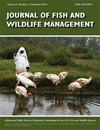红湖渔业恢复前、中、后的红眼鱼繁殖力比较
IF 0.9
4区 环境科学与生态学
Q4 BIODIVERSITY CONSERVATION
引用次数: 0
摘要
从20世纪早期到中期,明尼苏达州的红湖支持了大量的白眼山德玻璃体渔业,但在20世纪90年代末经历了一次重大崩溃。在一项成功的机构间恢复计划之后,种群数量已经反弹,现在支持着有价值的商业和休闲渔业。与红湖白眼种群崩溃和随后恢复相关的种群密度变化为研究不同开发率下相对繁殖力(每公斤体重卵数)的潜在变化提供了难得的机会:过度开发(1989年数据)、恢复(2004年数据)和恢复(2017年数据)。1989年春(n=30)在黑鸭河和塔马拉克河采集,2004年春(n=30)和2017年春(n=30)在塔马拉克河采集。结果表明,2017年的相对繁殖力(50,768,SD=10,266)明显低于1989年(58,216,SD=6,211)和2004年(61,964,SD=7,472)。我们假设,不同渔业国家之间相对繁殖力的差异是由于在繁殖力估计前几年不同的捕捞率造成的瓦利眼鱼种群丰度的差异。本文章由计算机程序翻译,如有差异,请以英文原文为准。
Comparisons of Walleye Fecundity Before, During, and After Rehabilitation of the Red Lakes Fishery
Abstract The Red Lakes, Minnesota, supported a substantial Walleye Sander vitreus fishery from the early to mid-20th century, but experienced a major crash in the late 1990s. The population has since rebounded following a successful inter-agency recovery program and now supports valuable commercial and recreational fisheries. The variation in population densities associated with the collapse and subsequent recovery in the Red Lakes Walleye population provides a rare opportunity to study potential changes in relative fecundity (eggs/kg of body mass) under varying rates of exploitation: overexploited (1989 data), recovering (2004 data), and recovered (2017 data). Female Walleye were collected spring 1989 (n=30) in the Blackduck and Tamarac rivers and spring 2004 (n=30) and 2017 (n=30) in the Tamarac River. Results indicate relative fecundity was significantly lower in 2017 (50,768, SD=10,266) than in 1989 (58,216, SD=6,211) and 2004 (61,964, SD=7,472). We hypothesize differences in relative fecundity among fishery states were due to differences in Walleye population abundances caused by varying exploitation rates in the years leading up to fecundity estimates.
求助全文
通过发布文献求助,成功后即可免费获取论文全文。
去求助
来源期刊

Journal of Fish and Wildlife Management
BIODIVERSITY CONSERVATION-ECOLOGY
CiteScore
1.60
自引率
0.00%
发文量
43
审稿时长
>12 weeks
期刊介绍:
Journal of Fish and Wildlife Management encourages submission of original, high quality, English-language scientific papers on the practical application and integration of science to conservation and management of native North American fish, wildlife, plants and their habitats in the following categories: Articles, Notes, Surveys and Issues and Perspectives. Papers that do not relate directly to native North American fish, wildlife plants or their habitats may be considered if they highlight species that are closely related to, or conservation issues that are germane to, those in North America.
 求助内容:
求助内容: 应助结果提醒方式:
应助结果提醒方式:


